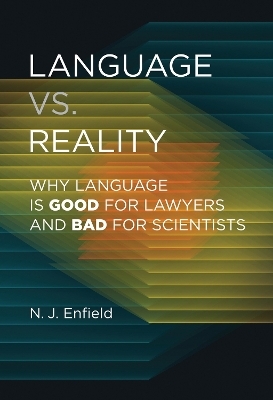
Language vs. Reality
Why Language Is Good for Lawyers and Bad for Scientists
Seiten
2024
MIT Press (Verlag)
978-0-262-54846-5 (ISBN)
MIT Press (Verlag)
978-0-262-54846-5 (ISBN)
- Lieferbar (Termin unbekannt)
- Versandkostenfrei innerhalb Deutschlands
- Auch auf Rechnung
- Verfügbarkeit in der Filiale vor Ort prüfen
- Artikel merken
A fascinating examination of how we are both played by language and made by language: the science underlying the bugs and features of humankind’s greatest invention.
Language is said to be humankind’s greatest accomplishment. But what is language actually good for? It performs poorly at representing reality. It is a constant source of distraction, misdirection, and overshadowing. In fact, N. J. Enfield notes, language is far better at persuasion than it is at objectively capturing the facts of experience. Language cannot create or change physical reality, but it can do the next best thing: reframe and invert our view of the world. In Language vs. Reality, Enfield explains why language is bad for scientists (who are bound by reality) but good for lawyers (who want to win their cases), why it can be dangerous when it falls into the wrong hands, and why it deserves our deepest respect.
Enfield offers a lively exploration of the science underlying the bugs and features of language. He examines the tenuous relationship between language and reality; details the array of effects language has on our memory, attention, and reasoning; and describes how these varied effects power narratives and storytelling as well as political spin and conspiracy theories. Why should we care what language is good for? Enfield, who has spent twenty years at the cutting edge of language research, argues that understanding how language works is crucial to tackling our most pressing challenges, including human cognitive bias, media spin, the “post-truth” problem, persuasion, the role of words in our thinking, and much more.
Language is said to be humankind’s greatest accomplishment. But what is language actually good for? It performs poorly at representing reality. It is a constant source of distraction, misdirection, and overshadowing. In fact, N. J. Enfield notes, language is far better at persuasion than it is at objectively capturing the facts of experience. Language cannot create or change physical reality, but it can do the next best thing: reframe and invert our view of the world. In Language vs. Reality, Enfield explains why language is bad for scientists (who are bound by reality) but good for lawyers (who want to win their cases), why it can be dangerous when it falls into the wrong hands, and why it deserves our deepest respect.
Enfield offers a lively exploration of the science underlying the bugs and features of language. He examines the tenuous relationship between language and reality; details the array of effects language has on our memory, attention, and reasoning; and describes how these varied effects power narratives and storytelling as well as political spin and conspiracy theories. Why should we care what language is good for? Enfield, who has spent twenty years at the cutting edge of language research, argues that understanding how language works is crucial to tackling our most pressing challenges, including human cognitive bias, media spin, the “post-truth” problem, persuasion, the role of words in our thinking, and much more.
N. J. Enfield is Professor of Linguistics at the University of Sydney and Director of the Sydney Centre for Language Research. He is the author of The Anatomy of Meaning, The Utility of Meaning, How We Talk, and other books.
Contents
1 Introduction 1
2 Bodily Awareness 9
3 Body Ownership 25
4 Representations 39
5 Multisensory Integration 69
6 Agency 91
7 Distortions 113
8 Interoception 133
9 Add- Ons 145
10 Conclusion 165
Acknowledgments 171
Glossary 173
Notes 177
Index 201
| Erscheinungsdatum | 16.02.2024 |
|---|---|
| Zusatzinfo | 33 |
| Sprache | englisch |
| Maße | 152 x 229 mm |
| Themenwelt | Schulbuch / Wörterbuch ► Wörterbuch / Fremdsprachen |
| Geisteswissenschaften ► Psychologie ► Verhaltenstherapie | |
| Geisteswissenschaften ► Sprach- / Literaturwissenschaft ► Sprachwissenschaft | |
| ISBN-10 | 0-262-54846-1 / 0262548461 |
| ISBN-13 | 978-0-262-54846-5 / 9780262548465 |
| Zustand | Neuware |
| Informationen gemäß Produktsicherheitsverordnung (GPSR) | |
| Haben Sie eine Frage zum Produkt? |
Mehr entdecken
aus dem Bereich
aus dem Bereich
Buch (2024)
Beltz (Verlag)
38,00 €


